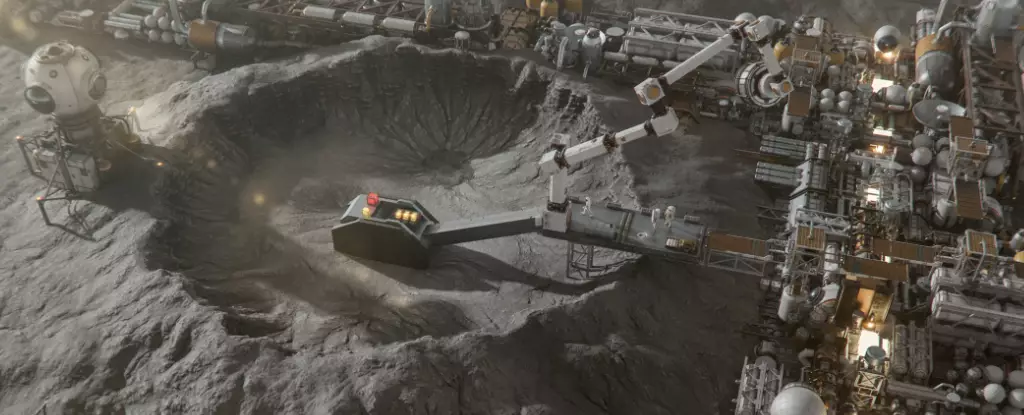As we progress deeper into the 21st century, the prospect of mining the Moon has escalated from a science fiction concept into an impending reality. By the close of this decade, both governments and private entities are likely to embark on ambitious projects aimed at extracting lunar resources. The Moon presents a wealth of materials, from water ice that can be converted into rocket fuel to rare Earth metals that power modern technology. However, as we stand on the cusp of this new frontier, it is crucial to engage in a thoughtful dialogue regarding the ethical dimensions of lunar mining.
NASA’s Artemis program, with its multibillion-dollar budget, is often viewed as a pivotal initiative to reignite human exploration of the Moon. Yet, its deeper implications lie in paving the way for commercial enterprises looking to tap into the Moon’s resources. Countries like China are following suit, igniting a competitive spirit reminiscent of the Cold War space race but with updated players and motivations. The excitement is palpable; however, amidst this ambition, we must not lose sight of the responsibilities that come with these endeavors.
Currently, transporting supplies from Earth to lunar destinations is astronomically expensive. For context, a liter of water fetched from Earth is worth more than gold by the time it reaches the lunar surface. Conversely, extracting water from lunar ice represents not only significant cost savings but also a chance to facilitate longer missions deeper into space, including potential journeys to Mars. Meanwhile, rare Earth elements extracted from the lunar surface could substantially alleviate the strain on Earth’s finite resources, presenting a double-edged sword of opportunity and risk.
Despite the tantalizing advantages of lunar mining, there are significant environmental concerns. Lunar dust, distinct for its unique properties, poses a fundamental challenge to mining operations. When disturbed, this dust can disperse extensively due to the Moon’s lack of atmosphere, leading to visible alterations of its surface over time. Responsible mining will hinge on the ability to manage this lunar regolith, ensuring minimal disruption to the pristine environment of our celestial neighbor.
The regulatory landscape regarding the Moon is complex and filled with ambiguity. The Outer Space Treaty of 1967 clearly states that no nation can claim ownership over the Moon or any celestial body. However, the implications for private corporations engaged in resource extraction remain murky. While the 1979 Moon Treaty posits that the Moon’s resources should be considered the “common heritage of mankind,” allowing for commercial mining opens an ethical debate. The 2020 Artemis Accords further complicate matters by endorsing mining while simultaneously asserting that no claims of ownership over the Moon can be made.
This contradiction poses a question: if resources are extracted, who benefits? Advocates argue that profits from lunar mining should circulate back to the global community, rather than being restricted to wealthier nations or corporations capable of making the journey. Fostering the idea of shared benefit could be key to mitigating tensions and ensuring equitable resource allocation.
While technological advancements hold immense potential, the human aspect cannot be overlooked. The realities of labor in an extraterrestrial environment present unique challenges, including exposure to high levels of cosmic radiation and the psychological impacts of prolonged isolation. Envision a team of lunar miners coping with intense health risks, unregulated hours, and unsafe living conditions. The potential for exploitation is immense, with the specter of “space tyranny” lurking just out of sight, as noted by scientists like Charles S. Cockell.
The need for comprehensive regulations governing labor practices on the Moon has never been more urgent. As we set our sights on resource extraction, it is critical to establish protocols that prioritize worker safety and welfare, much like those we strive for here on Earth. With governing bodies situated thousands of miles away, the responsibility to protect those venturing into this new domain falls heavily on the shoulders of those conducting the operations.
The Moon is laden with possibilities; it could serve as a vital resource hub for humanity’s future endeavors in space. However, the lessons of history remind us of the consequences of reckless exploitation. A forward-thinking approach to lunar mining should include stringent regulations that prioritize fairness, safety, and human rights. As we contemplate the next steps in our celestial endeavors, it is imperative that we act with foresight and responsibility, ensuring that our legacy in space is not one of depletion but one of stewardship and inspiration for generations yet to come.


Leave a Reply